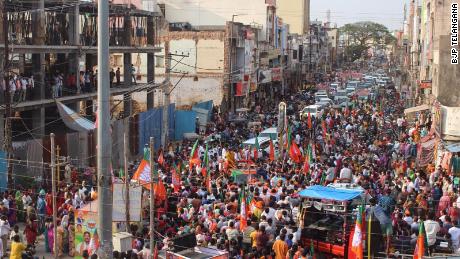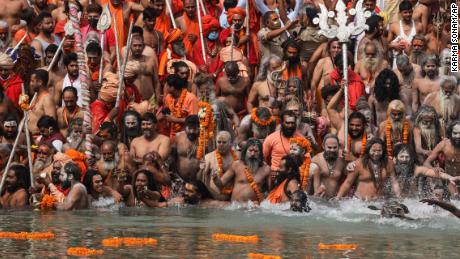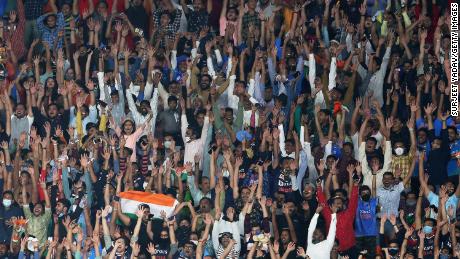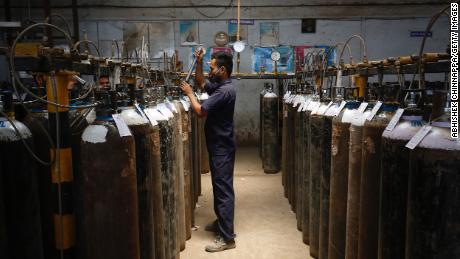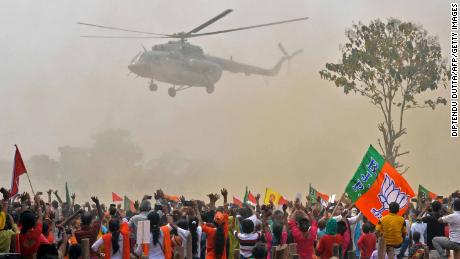As the prime minister held political rallies, many believe he failed to prepare the country for a second wave of Covid-19
His country was on the brink of a humanitarian crisis. That day, India recorded more than 261,000 new coronavirus cases — more than many countries have seen during the entire pandemic.
Others in Modi’s orbit have argued state governments are to blame for not imposing regional lockdowns and mismanaging their health care systems. Last weekend, Health Minister Harsh Vardhan said oxygen shortages at hospitals were a problem not of supply but distribution, which he claimed was the responsibility of state governments.
But many in India believe responsibility lies with Modi and his Hindu nationalist government, which not only didn’t prepare for a second wave but also encouraged mass gatherings at Hindu festivals and political rallies, including in a closely contested battleground state.
Modi’s pandemic PR moves
Modi has been keen to tie himself to positive aspects of India’s pandemic responses.
With his name tied to these positive initiatives, a first wave that avoided the catastrophic caseload some experts feared, and a roaring pharmaceutical industry that had produced a homegrown vaccine, India’s pandemic response was on track to be a PR win for Modi. The country was positioning itself to help other countries, having exported more than 66 million doses of vaccines, rather than be the one in need of aid.
“You can’t blame people for thinking ‘maybe the government knows best, maybe things are back to normal, maybe we should go out and live our normal lives,'” said Pradeep Taneja, an expert on Asian politics at the University of Melbourne and a fellow of the Australia India Institute.
Yet mutations had been circulating overseas for months, and epidemiologists in India believed another wave was coming. While the second wave was inevitable, its size took everyone by surprise, said Ramanan Laxminarayan, an economist and epidemiologist at Princeton University who is in New Delhi.
“I think there was a premature sense of optimism among many that was probably unwarranted and in hindsight has ended up being quite deadly,” he said.
Asia politics expert Taneja said: “Modi was complacent, even arrogant in thinking that India had succeeded when more developed countries, countries with much stronger health systems … were struggling.”
Fury over the second wave
As it became clear India’s cases were spiraling, Modi stayed largely silent — and a second nationwide lockdown that some expected never came. In a national address last month, he actively advocated against a nationwide lockdown.
“People expect their governments to assure them that they are in charge and taking care of things … but the government is almost missing in action,” Pradeep Taneja said. “Now that India is facing the worse crisis, in my lifetime, certainly, where is the Prime Minister?”
Despite this, experts believe Modi was too concerned about losing support to impose another nationwide lockdown.
This time, Modi has instead advocated for “micro containment zones,” where restrictions are focused on areas of concern. It’s been up to states to decide when and how to implement them. So far, at least eight of India’s states and territories have some form of lockdown, ranging from a curfew in Karnataka and Gujurat states to a full lockdown in New Delhi.
Rajeev Sadanandan, a former bureaucrat in the health ministry of the state of Kerala and CEO of non-profit Health Systems Transformation Platform, said the reason for that was simple: “Last time, the lockdown was widely criticized as a failure” because it came at a huge economic cost and suffering to the poor.
The legislative elections held over the past month in Assam, West Bengal, Kerala and Tamil Nadu states, and Puducherry union territory, may have also been a factor. Two of those are BJP-run, while one — West Bengal — was a closely contested state. When asked why BJP had continued to hold rallies, the party’s spokesman Taneja said the “autonomous” Election Commission of India allowed election events to proceed.
Michael Head, a senior research fellow in global health at the University of Southampton’s Clinical Informatics Research Unit, said aside from restricting gatherings and having clearer messaging, the government could have curtailed cross-country travel — as it did during the first lockdown.
Lack of preparedness
As India enjoyed a relative period of calm at the beginning of this year, Modi could have been preparing his country for another battle with Covid-19, patching up health care gaps in preparation for a possible future outbreak.
Pradeep Taneja said there was “criminal negligence on the part of the government” to not prepare for another wave despite knowing other countries with better health care systems had experienced multiple waves.
The criticisms of the lack of preparedness in India’s government, however, go beyond Modi.
As human rights activist Harsh Mander puts it, India had “starved” its public health systems for decades — long before Modi’s time in office.
Sadanandan, the former Kerela health official, said most parts of India did not have an adequate surveillance system to keep track of the outbreak. But to him, that was a state-level failing — not a central government one — as health is a state issue. “I’m not surprised by what has happened because we’ve seen this happen for many epidemics,” he noted.
Was it all Modi’s fault?
To critics, while state leaders have some blame to bear, ultimately if Modi is going to take credit for India’s pandemic wins, he also needs to take responsibility for its pandemic failings.
His extraordinary popularity means his actions have power — so underplaying the risk of the pandemic could have influenced how millions of his followers across the country acted. By the start of this year, many people in India stopped wearing masks and many social distancing measures had fallen by the wayside.
It’s too early to know if the grim scenes India is witnessing will tarnish Modi’s reputation. There are still three years before the next general election, and Modi has no clear challenger.
But Taneja expects to see a “significant reevaluation of the Modi government by the Indian public.”
“No single person can be blamed for the catastrophe that India finds itself in. But if you are the Prime Minister, clearly the primary responsibility falls on you,” he said.
Barkha Dutt, a Washington Post columnist whose father died from Covid a few days ago, said her father’s last words were: “I’m choking. Please give me treatment.” She felt angry and betrayed that as people across India battled the virus, politicians were still holding rallies. Dutt described Modi’s government as “callousness,” “tone deaf” and in “complete denial.”
She said the health care system had clearly collapsed — but that wasn’t the fault of doctors, hospitals or frontline workers.
“We’ve been failed by the government that did not think to put in place a contingency plan for the second wave,” she said. “Is anyone going to take accountability for the thousands that are dying?”
Esha Mitra and Manveena Suri contributed reporting from New Delhi. Akanksha Sharma contributed reporting from Hong Kong.
![]()



